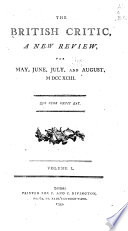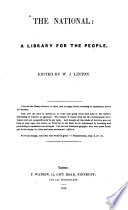 | 1793 - 524 pages
...imprefled with a ftrong prefentiment of the improvements he has yet to accomplim? There is no fcience that is not capable of additions ; there is no art that may not be carried to ftill higher perfection. If this be true of all other.fciences, why not of morals ? If this be true... | |
 | Robert Blakey - Ethics - 1833 - 378 pages
...instruments, machines, together with all the wonders of painting, poetry, eloquence, and philosophy. " Such was man in his original state, and such is man...that may not be carried to a still higher perfection. If this be true of all other sciences, why not of morals ? If this be true of all other arts, why not... | |
 | 1839 - 446 pages
...belongs to nobody." Rousseau. Perfectibility of Man. — Is it possible for us to contemplate what Man has already done, without being impressed with a strong...that may not be carried to a still higher perfection. If this be true of all other sciences, why not of morals? If this be true of all other arts, why not... | |
 | Terrot Reaveley Glover - English literature - 1915 - 346 pages
...favourite tenet with thinkers — " Is it possible for us," wrote Godwin, " to contemplate what man has already done without being impressed with a strong...presentiment of the improvements he has yet to accomplish?" Reason and reflection had discovered the laws that rule the physical world and had applied them to... | |
 | Edwin Greenlaw, James Holly Hanford - American literature - 1919 - 714 pages
...depend for its force upon the train of reasoning which has already been brought forward under that head. inguish still higher perfection. If this be true of all other sciences, why not morals? If this be true of... | |
 | William Godwin - Philosophy, English - 1926 - 318 pages
...instruments, machines, together with all the wonders of painting, poetry, eloquence and philosophy. Such was man in his original state, and such is man...present behold him. Is it possible for us to contemplate I what he has already done without being impressed with a strong presentiment of the improvements he... | |
 | David Spadafora, James Spada - Social Science - 1990 - 488 pages
...written by Priestley or Price as easily as by Godwin: Is it possible for us to contemplate what [man] has already done, without being impressed with a strong presentiment of the improvement he has yet to accomplish? There is no science that is not capable of additions; there is... | |
 | Colin Wells - Literary Criticism - 2002 - 276 pages
...and moral faculties of man?" concludes Condorcet. "Is it possible for us to contemplate what [ man ] has already done, without being impressed with a strong...presentiment of the improvements he has yet to accomplish?" asks Godwin, before asserting, "There is no science that is not capable of additions; there is no art... | |
| |